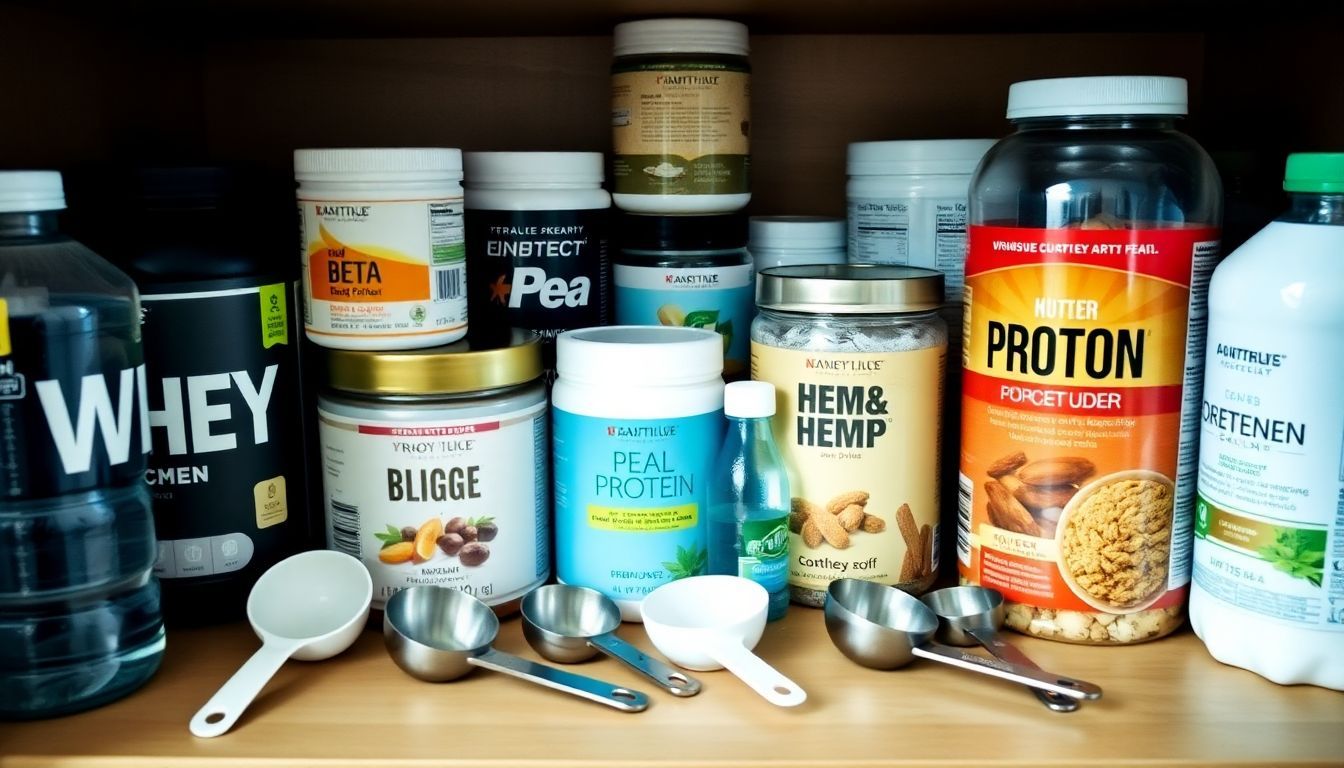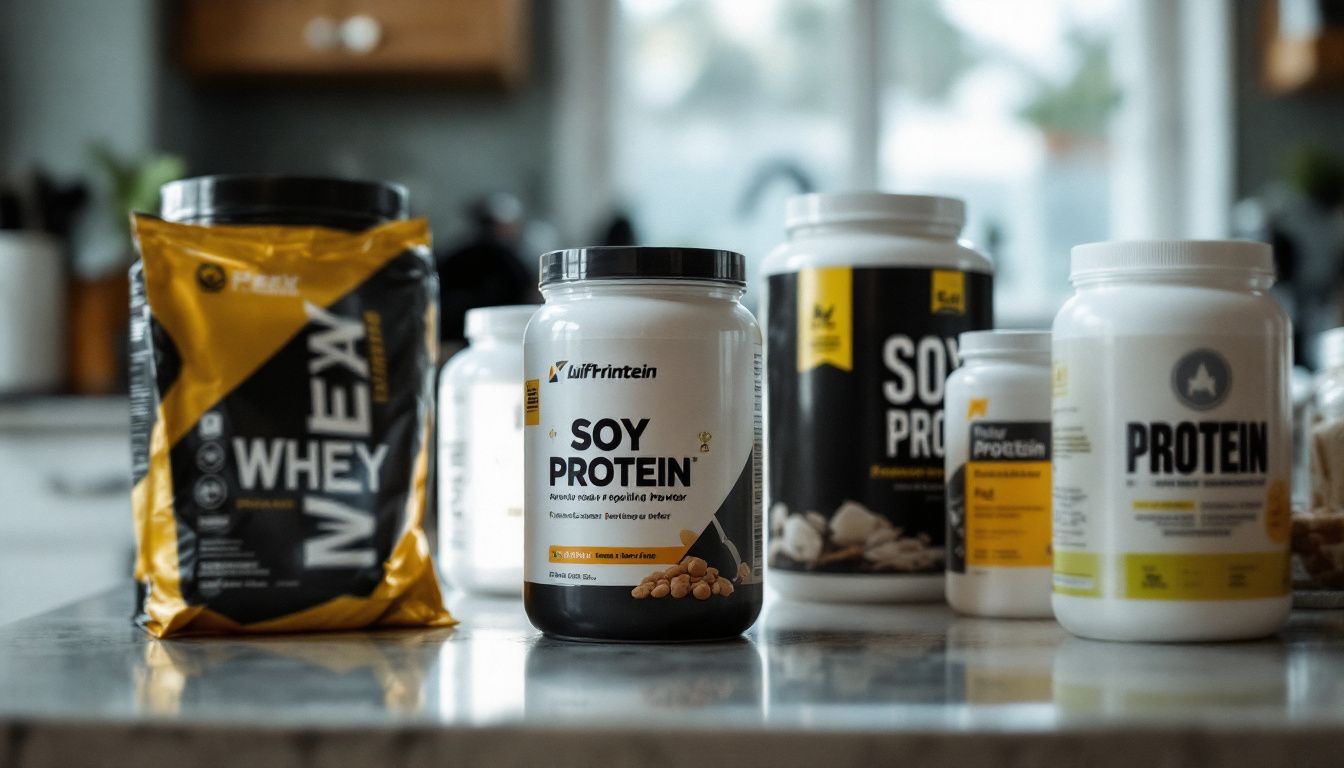Choosing the right protein powder can feel confusing. With so many options like whey, pea, or soy protein, it’s hard to know what works best for you. This guide will break down the types of protein powders and help you pick one that fits your needs and goals.
Thank you for reading this post, don't forget to subscribe!Keep reading—you’ll find answers here!
Key Takeaways
- Choose protein powders based on your goals, like whey for muscle growth or plant-based options for vegan diets.
- Check the label for at least 20 grams of protein per serving, no added sugars, and simple ingredients.
- Avoid lactose if intolerant by using whey isolate or non-dairy proteins like pea or egg white.
- Look for quality certifications (e.g., NSF Certified) to ensure safety and avoid harmful additives.
- Pair slow-digesting casein with overnight recovery or quick-digesting whey after workouts.
Understanding the Different Types of Protein Powders
Whey protein is a popular choice. It comes from dairy and contains all essential amino acids, making it a complete protein. It’s easily digestible and helps with post-workout recovery, muscle growth, and energy boosts.
Whey isolate has less fat and lactose than whey concentrate, which makes it great for lactose intolerance.
Plant-based protein powders like pea, soy, hemp, or brown rice appeal to vegans or those avoiding dairy. Pea protein is hypoallergenic and highly digestible. Soy protein may support lower cholesterol levels and bone health.
Hemp protein offers some fiber but has fewer essential amino acids compared to others. Brown rice protein is gluten-free but pairs well with other proteins for better amino acid profiles.
Key Factors to Consider When Choosing a Protein Powder
Picking the right protein powder can feel tricky but becomes easier with some guidelines. Different factors like health concerns, goals, and ingredients matter.
- Check Protein Type
Match the type to your needs. Whey protein is great for muscle growth and post-workout recovery. Pea protein or rice protein works well for vegetarians or those avoiding dairy products. For slower digestion, casein protein helps overnight muscle repair. - Avoid Added Sugars
Look at the label for sugars, artificial sweeteners, or high-intensity sweeteners like sucralose. These might cause weight gain or digestive issues. - Consider Digestive Issues
Avoid lactose if you have intolerance—you could pick whey isolate instead of whey concentrate. Gluten-free options suit people sensitive to grains. - Focus on Quality Testing
Choose powders certified by third-party testing like NSF Certified for Sport or USP Verified to avoid heavy metals and ensure safety. - Match Goals
Pick a low-carb option (5–15 grams per serving) if aiming for fat loss or managing diabetes. For muscle maintenance, go for one with branched-chain amino acids (BCAAs). - Look at Ingredients
Simpler is better—fewer additives mean higher-quality supplements with better absorption. - Know Protein Content
Good powders provide at least 20 grams of dietary protein per serving and include essential amino acids like leucine and lysine. - Think Sustainability
Plant-based proteins from peas, soybeans, or hemp seeds are eco-friendly options supporting plant-based diets while still giving complete proteins. - Test Protein Absorption
High scores like PDCAAS show better digestibility; egg white protein ranks higher than many other types. - Adapt to Allergies
Collagen protein avoids lactose while offering benefits for skin and joints… but lacks essential amino acids needed after resistance training. - Price vs Quality
Higher costs often signal better brands with certifications—but always check labels closely before buying!

How to Match Protein Powder to Your Goals
Choosing the best protein powder starts with knowing your goals. Different powders fit different needs, so pick wisely.
- Building Muscle
Use whey protein for muscle growth. It has a high biological value and plenty of essential amino acids (EAAs). Whey isolate or concentrate absorbs quickly, boosting muscle protein synthesis. - Weight Loss
Select a low-calorie option like whey or plant-based protein for weight management. Aim for 20 grams per meal to feel full and support fat loss. Avoid added sugars or artificial sweeteners in the ingredients list. - Post-Workout Recovery
Drink a fast-digesting shake within 60 minutes after exercise. Whey, pea, or brown rice protein help repair muscles and improve recovery time. - Vegan or Vegetarian Diets
Choose plant-based proteins like soy, pea, or hemp if avoiding animal sources. These options include complete proteins with essential vitamins and amino acids from plant-based foods. - Digestive Issues
Go with egg white protein or micellar casein if you have digestive problems caused by lactose intolerance. They are gentle on the stomach and still rich in nutrients. - Muscle Maintenance with Time Gaps
Use slow-digesting options like casein protein for overnight recovery or extended periods without eating. - Daily Protein Intake Limits
Keep total powder intake under 80 grams daily to avoid overloading your body, regardless of your goal.
Conclusion
Finding the best protein powder depends on your needs, goals, and preferences. Think about factors like health benefits, dietary limits, and budget. Always check labels for quality ingredients and avoid artificial fillers.
Whole foods should still be your main source of nutrients. Use protein powders as a helpful boost to support your fitness or recovery goals!
To further enhance your nutrition and health journey, discover the exciting benefits of postbiotics in our guide, “What Are Postbiotics? A New Frontier in Gut Health.”
